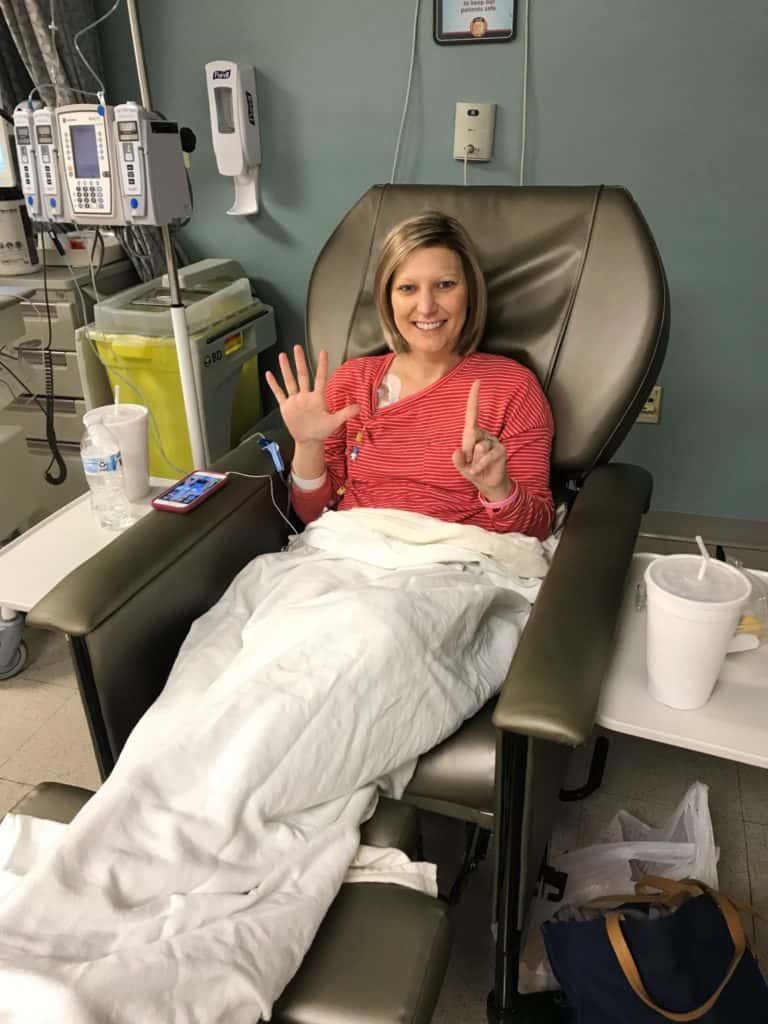View Larger Image

Carley Neill shares a joyful moment with her daughter, Emory, and newborn son Eli.
Diagnosed with Breast Cancer While Pregnant, Young Mom Puts Her Trust in UAMS
| Carley Neill was 16 weeks pregnant when she felt the lump. The busy mom of an active toddler, Neill knew this was something she could not ignore.
“I went to my OBGYN in Texarkana and was told it was probably hormone related,” she said. The doctor told her to keep an eye on it, and if the breast lump changed shape to let him know.
Four weeks later, shooting pain sent Neill back to the doctor where she was again reassured that her symptoms were probably a normal side effect of pregnancy.
As her baby grew, Neill continued to monitor the lump until, at 24 weeks, she was alarmed when it changed shape from round to oval. This time, the doctor sent her for an ultrasound, which was immediately followed by one mammogram and then another.
“I was on my way home when the doctor called. The mammogram results were suspicious, so they referred me to UAMS,” said Neill, who lives in the south Arkansas town of Magnolia.
On May 18, the day after her 35th birthday, Neill and her husband, Brad, arrived at the office of breast surgeon Ronda Henry-Tillman, M.D., in the UAMS Winthrop P. Rockefeller Cancer Institute. Henry-Tillman serves as chief of breast surgical oncology in the UAMS College of Medicine Department of Surgery.
Henry-Tillman immediately performed an ultrasound-guided core biopsy of her breast and the mass in her axillary lymph node. Within 15 minutes, she returned to tell the Neills the news: It was cancer.
“It shook us pretty hard,” said Neill, who was 30 weeks pregnant at the time. “My biggest fear was for the baby.”
Those fears, however, were quickly put to rest when Henry-Tillman assured Neill that, if necessary, she could safely undergo chemotherapy without any risk to her baby’s health, a fact that surprised Neill and her husband.
“I had no idea you could take chemo while you were pregnant. Dr. Henry-Tillman calmed our fears a lot on that first day,” she said.
On June 6, the Neills returned to the Cancer Institute to discuss Carley’s treatment plan. To their surprise, they met not only with Henry-Tillman, but also multiple other health care providers and support staff, including a medical oncologist, radiation oncologist, social worker, psychologist and financial counselor – all in one location.
“Carley was the first patient ever to participate in our multidisciplinary breast clinic. We lined up all the specialists and, in a matter of six or seven hours, she saw everyone associated with her treatment plan,” said Issam Makhoul, M.D., the medical oncologist overseeing Neill’s chemotherapy treatment.
Neill’s day also included an appointment with UAMS maternal-fetal medicine specialist Adam T. Sandlin, M.D., in his office located at nearby Freeway Medical Clinic. Sandlin is an assistant professor in the UAMS Department of Obstetrics and Gynecology, which manages high-risk pregnancies.
After examining Neill and reviewing her diagnosis, Sandlin determined the best course of action was to deliver early and scheduled the baby’s arrival for the following week. Baby Eli spent the next 26 days gaining strength in the UAMS neonatal intensive care unit, while his parents made the two-hour trip back and forth from Magnolia to visit him and prepare for Neill’s chemo regimen, which began June 29.
“Dr. Sandlin was amazing. He made us feel at ease and did a wonderful job of calming everyone’s nerves,” Neill said.
A total of eight chemo treatments were scheduled for Neill, whose cancer was determined to be stage 3 triple-negative breast cancer. In triple-negative breast cancer, the cancer cells do not contain the hormone receptors for estrogen and progesterone or the protein HER2. Therefore, the hormone-blocking therapies are not effective for women with this form of the disease, which is often aggressive and likely to spread or return after the initial treatment.
“This is not the type of breast cancer we normally see in pregnancy, but Carley has tolerated her treatment remarkably well and her tumor has shrunk significantly. We’re hoping to continue shrinking the tumor until it’s almost gone or completely gone,” said Makhoul, director of the UAMS Hematology/Oncology Division, adding that Neill’s treatment regimen achieves that high level of success in about 40 percent of patients.
Even if the tumor does not completely disappear, Neill is eligible to enroll in an immunotherapy clinical trial at UAMS for patients who have triple-negative breast cancer and meet other qualifications, Makhoul said. Immunotherapy uses the body’s own immune system to fight diseases, including cancer.
“It cannot have been easy having a baby and then starting chemo within a matter of days, but Carley is sailing through. She asks the right questions and established trust with her doctors, which was essential for her treatment. When you have both your own life and your baby’s life depending on someone else, you must have a high level of trust,” said Makhoul, who holds the Laura F. Hutchins, M.D. Distinguished Chair for Hematology and Oncology at UAMS.
Following the success of Neill’s multidisciplinary clinic experience, the UAMS Breast Team is in the process of replicating the process and expanding it to more patients.
“We have a complete team of specialists at the UAMS Cancer Institute who can meet the needs of patients with complex cases, such as Carley Neill, as well as those with more straightforward conditions,” said Henry-Tillman, who holds the Muriel Balsam Kohn Chair in Breast Surgical Oncology.
After finishing her chemo regimen in October, Neill will undergo surgery with Henry-Tillman, followed by radiation therapy under the care of Loverd Peacock, M.D., at the UAMS Radiation Oncology Center.
“All of our care at UAMS has been amazing, and now I can see the finish line,” she said.
